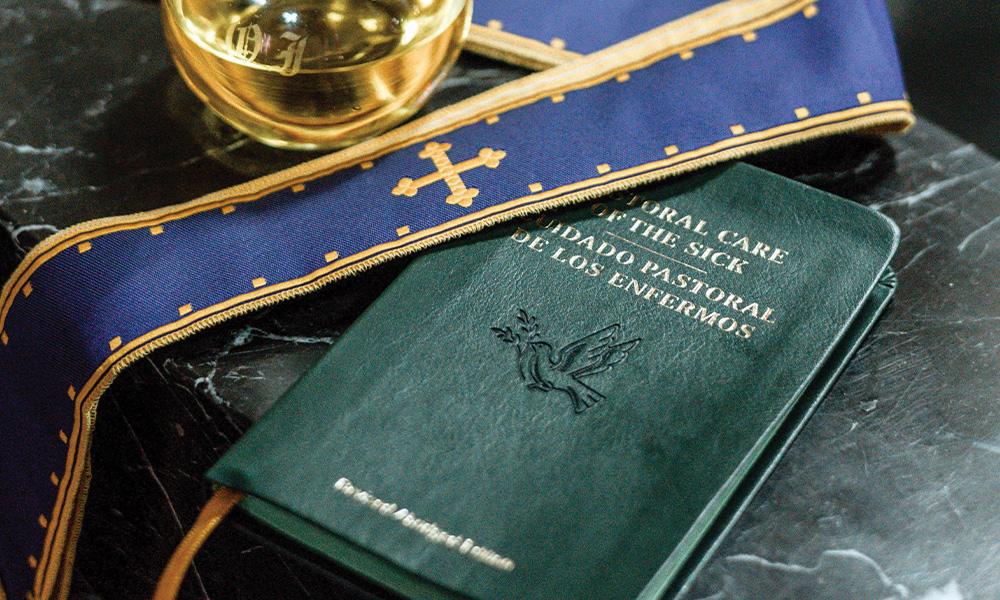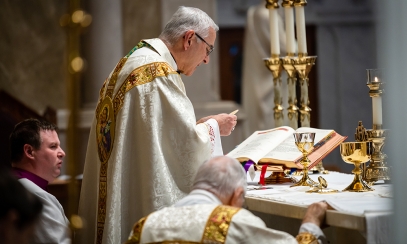
Anointing of the Sick and Last Rites
Is There a Difference?
Is There a Difference?
As a priest, I sometimes receive requests to visit a person who wants “last rites.” Naturally, I am grateful for the opportunity to offer these prayers for a dying person, preparing them to meet the Lord. When I arrive at the person’s bedside, however, I discover that what they are really requesting is the sacrament of anointing of the sick. These are two different rites.
As a priest, I sometimes receive requests to visit a person who wants “last rites.” Naturally, I am grateful for the opportunity to offer these prayers for a dying person, preparing them to meet the Lord. When I arrive at the person’s bedside, however, I discover that what they are really requesting is the sacrament of anointing of the sick. These are two different rites.
In the Epistle of James, we read, “Is there anyone among you sick? He should summon the presbyters of the Church, and they should pray over him and anoint him with oil in the name of the Lord, and the prayer of faith will save the sick person, and the Lord will raise him up. If he has committed any sins, he will be forgiven.” (Jas 5:14-15)
Once I heard a priest preach on the sacrament of anointing of the sick as being “for those who are going to get well.” The sacrament offers us healing in whatever way conducive to our salvation. Wellness includes spiritual, emotional, and physical health. The sacrament can be a means to physical healing, but it can also bring us spiritual and emotional healing.
The sacrament also unites us to the Passion of Christ. As St. Paul writes, “I am filling up what is lacking in the sufferings of Christ for the sake of His body, which is the Church.” (Col 1:24) Suffering can purify a person’s faith and the faith of others.
Because the celebration of the sacrament of penance is part of the rite of anointing of the sick, only a bishop or priest can administer the sacrament. However, the anointing confers the forgiveness of venial sins if the sick person is not able to attain it through the sacrament of penance because of unconsciousness.
The last rites, or Commendation of the Dying, is separate from the sacrament of anointing of the sick, but it may be celebrated in addition to the sacrament. It includes the apostolic pardon, the full pardon and remission of all sins, including mortal sins, if these were not forgiven in the sacrament of penance. Last rites also include viaticum, or “food for the journey,” which is the person’s final reception of Holy Communion before dying. Finally, there is the Prayer of Commendation, commending the person to God at the end of their earthly life.
When should someone receive the sacrament of anointing of the sick? The Second Vatican Council’s “Constitution on the Sacred Liturgy” states, “As soon as any one of the faithful begins to be in danger of death from sickness or old age, the fitting time for that person to receive this sacrament has certainly already arrived.” (73) This tells us two things: The sacrament is meant for those who are seriously ill, and the sacrament can be repeated if the person recovers and then later becomes seriously ill again.
I would also recommend that a person going through surgery where anesthesia is involved be anointed before the surgery. Pregnant women who are experiencing problems with their pregnancy should be anointed for their benefit and the benefit of their baby. Finally, the mentally ill who may be unable to function in society should be considered “seriously ill” and, therefore, qualified to receive the sacrament.
When should a person receive last rites? If the person receives a terminal diagnosis or is placed in hospice care by their physician, it is time for last rites. This is especially true because the person must be conscious to receive viaticum. Sometimes, people wait until the person is near death before contacting the priest. In this case, the dying person’s opportunity to participate in the rites is diminished.
In The Pastoral Care of the Sick, we read, “Christians have the responsibility of expressing their union in Christ by joining the dying person in prayer for God’s mercy and for confidence in Christ. The presence of a priest or deacon shows more clearly that the Christian dies in communion with the Church.” (213) Indeed, Christians have the responsibility to pray for the sick and dying. We can all make a difference in the lives of others through prayer, especially those facing sickness and death.
A priest, the person facing sickness or death, and their family can all benefit from participating in the sacrament of anointing of the sick and last rites. Knowing the difference between the two and when each is needed can be helpful in difficult times, for they both strengthen faith and bring comfort to all involved.
Father Bill Lucas is currently the pastor of Our Lady of the Lake Catholic Church in Pell City. He was ordained in 1990 and also serves as the Dean of the Southeast Deanery of the Diocese of Birmingham.



